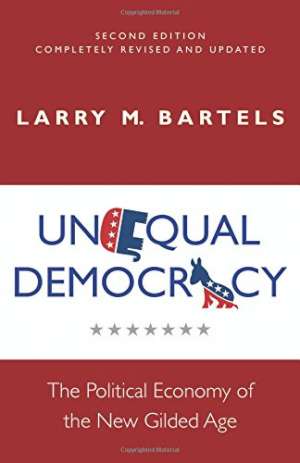02 March 2017
Unequal Democracy
The Political Economy of the New Gilded Age
Larry M Bartels
2016, Princeton University Press, 344 pages,
ISBN 978-0691172842
Reviewer: Dame Kate Barker

This was a good choice for reading in early 2017. Its powerful theme is how far economic inequality undermines democracy in the US; with the subtitle ‘The political economy of the new gilded age’, it updates a book first published in 2008. Based on contemporary political commentary and drawing on many surveys of voter opinion, Bartels seeks to explain why, although many Americans express concern about inequality, they have nonetheless strongly supported policies exacerbating it.
Part of the reason, he suggests, is voter ignorance. Several surveys suggest voters have little knowledge of recent economic trends in general, let alone the detail of policies affecting equality. In addition (and this is probably no surprise) people do not really vote in their narrow economic interest, but rather are swayed by association with political parties and interest groups.
Looking over the history of elections and economic fortunes in the US, poorer groups have fared better under the Democrats. However, Republicans have often done well by exploiting the myopia of voters and engineering a good growth rate just ahead of an election. Further, voters may believe that one day they will be among the richer groups. Hence, although Americans in surveys suggest that they care about inequality, and certainly think that the rich should pay their taxes, there is less evidence of interest in redistribution of incomes or wealth. But there is evidence that many are ignorant of the facts about inequality.
Bartels devotes considerable attention to the paradox of support for the Bush tax cuts, and the failure of the Obama administration to be able to repeal them, despite the apparent voter preference towards higher taxation for the rich. Part of the reason for this was that those wanting to retain the tax cuts felt more strongly, so it was more likely to affect how they voted. Even more paradoxical is estate tax, where the Democrats opposed the repeal of the tax, but public opinion, possibly based on misconception, supported reductions in estate tax.
Most puzzling, the book argues, is the decline in the value of the minimum wage, despite the fact that this commands widespread popular support among American voters. This he links to the greater direct impact of wealthier citizens on the elected politicians, whereas poorer people can only have an impact via the ballot box. So the wealthier may have more effect on day-to-day policy choices. Policy makers, believing they have superior information, don’t always respond to the views of voters.
The financial crisis might have been expected to change views and policy with regard to inequality – but despite Obama claiming this as ‘the defining challenge of our time’, there was still little traction for effective policies. Bartels ends the book with the claim that democracy could enable choices to be made to protect the most vulnerable (for example as in New Orleans by Hurricane Katrina) but clearly doubts that Americans will vote in this way, despite the strong evidence about the benefits to the ‘have-nots’ of Democratic administrations.
Is it any better in the UK? There is a brief comment about Tony Atkinson’s last book, Inequality, being too optimistic in asserting the power of individual citizens to affect policy (rather undermining Bartels’ final optimistic note). But I suspect the real issue here, as in the US, is the lack of popular support for the kind of radical change that could fully address the issue.
It was interesting to read this book in the wake of Donald Trump’s election victory. Although the book was re-written in 2016, and has some discussion of Bernie Saunders’ campaign, there are only three references to Trump, two of which are merely about his wealth. The third reads: ‘Perhaps an eclectic populism of the sort represented by Donald Trump could erode or revise the intense partisan divisions.’ Well, we will have to wait and see.
